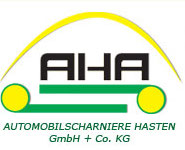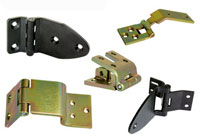Quality assurance agreement
Preamble (description of the object of the contract)
This quality assurance agreement is the contractual stipulation of the basic technical and organisational conditions and processes between customer and supplier which are necessary for achieving the intended quality objective. It describes the minimum requirements from the management system of the contractual partners with regard to quality assurance.
In particular special requirements of the production process and product release procedure are stipulated with the quality assurance agreement.
General agreements
Scope agreement, object of contract
This agreement regulates the quality requirements for all development services and/or products, which are provided and/or delivered especially for the contractual partner during its term insofar as the scope is not limited to certain services and/or deliveries according to Annex 1.
Individual clauses of this agreement shall not apply insofar as they contradict preceding contracts, e.g. development or purchase contracts.
This agreement and amendments and addendums must be made in writing. Specific amendments to this quality assurance agreement are recorded in
Annex 2.
1.2 Quality management system of the supplier
The supplier undertakes to the permanent application of a quality management system according to ISO/TS 16949:2002 or at least a system shall meet all contextual requirements of the standard DIN EN ISO 9001:2000.
Other regulations such as e.g. of the following organisations:
VDA (Germany)
AIAG (USA)
EAQF (France)
AVSQ (Italy)
shall only become part of the contract if they are agreed in writing.
The supplier is obliged to the zero-error target and must continuously optimise its services accordingly.
Insofar as the customer makes production and testing means, in particular means and equipment within the framework of the procurement of deliveries available to the supplier, these must be included by the supplier in his quality management system as own production and testing means insofar as not otherwise agreed.
Quality management system of the sub-suppliers
The supplier shall make an effort to oblige his sub-suppliers to observe the duties assumed by him under this contract. In case the supplier cannot assert the assumption of the duties with sub-suppliers he shall inform the customer and the contractual partners shall attempt to reach a mutual solution.
The customer can demand documented proof from the supplier that the supplier has convinced himself of the validity of the quality management system at his sub-suppliers and/or has ensured the quality of his purchased parts through other suitable measures.
Audit (at the supplier)
The customer is entitled to determine through an audit whether the quality assurance measures of the supplier guarantee the customer demands. The audit can be carried out as a system, process or product audit and is to be agreed in time before the planned execution. Audits of authorized certification companies are to be taken into account thereby. Reasonable restrictions of the supplier are accepted to safeguard his business secrets. The audit types which are to be applied refer to DIN EN ISO 9001 and to ISO/TS 16949.
If quality problems occur which are caused by services and/or deliveries of sub-suppliers, the supplier must upon request of the customer clarify the possibility of a joint audit at the sub-supplier.
Documentation, information
The duty to store the stipulation and proof documents with special archiving is 15 years (cf. VDA volume 1 “keeping of proof”). The supplier must grant the customer inspection of these documents upon request.
If it is recognised that reached agreements (e.g.: concerning quality features, deadlines, delivered quantity) cannot be observed then the supplier is obliged to inform the customer thereof as well as about the more detailed circumstances. In the interest of finding a quick solution the supplier is obliged to disclose the data and facts.
If the supplier determines an increase in the deviations of the actual condition from the planned condition of the products (reduction in quality) he shall inform the buyer thereof and about planned remedial measures immediately.
Before a change in production processes, materials or supplier components for the products, relocation of production locations, further changes in processes or equipment for inspecting the products or of other quality assurance measures the supplier shall inform the customer in plenty of time to the extent that it can examine whether the change can have negative implications. The notification obligation is regulated through the sampling regulation.
All changes to the product and changes to the production process are to be documented in a product life cycle and to be treated in line with VDA Volume 2 “Assurance of the quality of deliveries”.
Agreements concerning the product
Development, planning
The customer must ensure that he makes the specifications available to the supplier with all relevant documents, such as e.g. drawings, BOM and CAD data at an early stage and in full. The supplier shall examine the specifications incl. all technical documents for completeness and exemption from objections. The customer must be informed about thus recognised defects. These are to be remedied by mutual agreement.
The supplier undertakes to apply project management during the planning phase of products, flows and other cross-unit tasks already and grant the customer inspection of the project time schedule upon request.
In the development phase the contractual partners must apply suitable preventive methods of quality planning such as e.g. analyses production capability, fault tree analysis, reliability calculation, FMEA etc. (cf. VDA Volume 4 “Loose leaf register”).
The experiences (process flows, process data, capability studies, etc.) from similar projects are to be taken into account. Features with special requirements from documentation and archiving are to be stipulated (cf. VDA Volume 1).
The production and test conditions are to be coordinated and documented between customers and suppliers for prototypes and pre-serial parts. The aim is to produce the parts under conditions which are similar to serial production.
The supplier must conduct and document analyses of the suitability of the used production systems for the agreed product and process features. If stipulated capability key values are not achieved the supplier must either optimise his systems accordingly or carry out suitable inspections of the produced products in order to exclude faulty deliveries.
The process and product release is to be carried out before the start of serial production according to VDA Volume 2.
Construction or development approvals by the customer must be carried out before the production process and product approval process.
Serial production, traceability, identification, reports of defects
In case of interferences to processes and deviations in quality at the customer or supplier the causes must be analysed, measures initiated for improvements and their validity examined. If in an individual case products do not have to be delivered which are in line with specifications a special written release is to be obtained by the customer in advance. The customer is also to be informed immediately about subsequently recognised deviations.
The supplier undertakes to ensure the traceability of the products delivered by him in line with a risk estimate. In the event of a determined error traceability must be possible to the extent that a delimitation of the quantities of damaged parts/products can be carried out. It is further to be ensured that all deliveries to the customer are carried out according to the First in – First out principle. The customer shall inform the supplier of the data which are required for traceability.
With regard to the labelling of products, parts and the packaging the claims agreed with the customer are to be observed. It is to be ensured that the labelling of the packaged products is also identifiable during the transport and the storage. Deviations from existing labelling duties require a written agreement between suppliers and customers.
The supplier shall ensure that the goods are delivered in suitable means of transport approved by the customer in order to avoid damages and reductions in quality
(e.g. contamination, chemical reactions).
Inspections, complaints, measures
The supplier shall carry out inspections according to test planning in order to satisfy the agreed targets and specifications. Both contractual partners are obliged to the zero-error-target.
In the serial production the supplier must prove the process capability for the agreed features by means of suitable processes (e. g. statistical process regulation or manual control card technology) over the whole production time.
If the required process capability is not achieved then the quality is to be secured using suitable testing methods; the production process is to be optimised accordingly in order to achieve the required capability.
The customer shall inspect the products procured from the supplier upon receipt for the compliance with quantities and identity as well as for externally visible damages.
The customer must report defects to a delivery to the supplier immediately as soon as they have been determined according to the conditions of a proper business flow. Insofar the supplier waives the objection of the late report of defects.
Insofar as this is reasonably according to proper course of business the customer shall either examine the modules produced by using the delivery before commencement of the next production section or subject the product produced by using the module to an inspection.
The supplier receives failed parts for analysis insofar as not otherwise agreed. In case of dispute a joint assessment shall be carried out by the customer and supplier.
In case of defects in deliveries the supplier must ensure help immediately (substitute deliveries, sorting or follow-up work).
Liability
The agreement of quality targets and –measures does not affect the liability of the supplier for warranty and damages claims of the customer owing to defects of the deliveries.
“This quality assurance agreement does not establish any claims from liability for defects or claims for damages for other legal grounds.”
Non-disclosure obligation
The supplier undertakes to maintain secrecy towards the customer according to the following points.
Definitions
The supplier is each person, works for the customer based on a valid framework conclusion or in the run-up to a development and supply contract.
Business or trade secrets are all verbal or written information, data and files, which are forwarded to the supplier within the framework of a framework agreement or via other media.
Non-disclosure obligation
The supplier undertakes to maintain strict secrecy concerning business or trade secrets of the afore-mentioned type, not to disclose these to third parties, to use these exclusively for the purposes as envisaged as per contract and to take all suitable measures in order to ensure the secrecy of the confidential information according to this obligation declaration.
This includes that in particular
no details concerning the obtained information are passed to third parties.
suitable security precautions are to be taken when processing and saving data on IT systems and in their transmission which at no time allow third parties to have access to these data.
the use and the access of the information is only permitted for executing the tasks as envisaged as per contract.
Sub-suppliers
Insofar as the supplier justifiably uses the services of sub-suppliers for satisfying his contractual obligation he shall also oblige these to maintain secrecy according to this obligation in a written form.
Entry into force
, term
The non-disclosure obligation shall come into force when signed and end after expiry of the business relations or the cooperation 5 years after this time insofar as no other regulation is reached between the customer and the supplier in a subsequent agreement.
Arbitration agreement
, applicable law
The place of jurisdiction for all disputes from in connection with this non-disclosure obligation is Remscheid.
Term of the agreement
This quality assurance agreement shall apply for an unlimited period of time. It can however be terminated by each of the two contractual partners in writing with a period of notice of three months. The termination of this agreement shall have no effect on the validity of current single supply contracts until their full processing.
Further customer-/product-specific requirements.
The requirements from Annex 1 must be taken into account.





